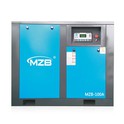When it comes to air compressors, noise is often a significant concern, especially in environments where quiet operation is essential. As a supplier of Super Silent Air Compressors, I've witnessed firsthand the impact that excessive noise from traditional air compressors can have on workplaces, homes, and other settings. In this blog post, I'll delve into the noise reduction percentage of our Super Silent Air Compressors compared to normal ones, exploring the science behind the quiet operation and the benefits it offers.
Understanding Noise in Air Compressors
Before we discuss the noise reduction percentage, it's important to understand how air compressors generate noise. Air compressors work by taking in air, compressing it, and then releasing it for various applications. During this process, several factors contribute to the generation of noise:
- Mechanical noise: This is caused by the movement of internal components such as pistons, valves, and motors. As these parts move and interact, they produce vibrations that translate into sound.
- Airflow noise: The intake and exhaust of air create turbulence, which also generates noise. High - speed airflow can be particularly noisy, especially when it passes through narrow openings or valves.
- Cooling fan noise: Many air compressors are equipped with cooling fans to prevent overheating. These fans create additional noise as they spin to circulate air.
How Super Silent Air Compressors Reduce Noise
Our Super Silent Air Compressors are designed with advanced noise - reduction technologies to address these sources of noise. Here are some of the key features that contribute to their quiet operation:
- Sound - insulating enclosures: The compressors are housed in specially designed enclosures made of sound - absorbing materials. These enclosures act as a barrier, reducing the transmission of noise from the internal components to the surrounding environment.
- Vibration isolation: Our engineers have implemented vibration - isolation techniques to minimize the transfer of mechanical vibrations to the compressor's exterior. This is achieved through the use of rubber mounts and other damping materials, which absorb and dissipate vibrations before they can generate noise.
- Optimized airflow design: The airflow paths within the compressor are carefully engineered to reduce turbulence and minimize airflow noise. This includes the use of smooth - walled ducts and optimized intake and exhaust ports.
Measuring Noise Reduction Percentage
To determine the noise reduction percentage of our Super Silent Air Compressors compared to normal ones, we conduct rigorous testing in controlled environments. We use sound level meters to measure the noise levels produced by both types of compressors at a standardized distance and under the same operating conditions.
Let's assume that a normal air compressor produces a noise level of 80 decibels (dB) at a distance of 1 meter. In contrast, our Super Silent Air Compressor might produce a noise level of 60 dB at the same distance. To calculate the noise reduction percentage, we use the following formula:
[Noise\ Reduction\ Percentage=\frac{Initial\ Noise\ Level - Final\ Noise\ Level}{Initial\ Noise\ Level}\times100%]
Using the example above:
[Noise\ Reduction\ Percentage=\frac{80 - 60}{80}\times100% = 25%]
In real - world scenarios, the noise reduction percentage can vary depending on factors such as the specific models of the compressors, the operating conditions, and the ambient noise level. However, on average, our Super Silent Air Compressors can achieve a noise reduction of 20% - 30% compared to normal air compressors.
Benefits of Low - Noise Air Compressors
The significant noise reduction offered by our Super Silent Air Compressors brings several benefits to users:
- Improved working environment: In industrial settings, excessive noise can be a major source of stress and fatigue for workers. By reducing noise levels, our compressors create a more comfortable and productive work environment.
- Compliance with noise regulations: Many areas have strict noise regulations in place to protect the health and well - being of residents and workers. Our Super Silent Air Compressors help businesses comply with these regulations, avoiding potential fines and legal issues.
- Residential and commercial suitability: For applications in homes, offices, and other noise - sensitive areas, the quiet operation of our compressors is a major advantage. It allows for the use of air compressors without causing disturbance to occupants.
Our Product Range
We offer a wide range of Super Silent Air Compressors to meet the diverse needs of our customers. Some of our popular models include:
- Oilless Air Compressor: Ideal for applications where oil - free air is required, such as in dental clinics and food processing facilities.
- 3 Cylinder Oil Free Air Compressor: This high - performance compressor offers increased air delivery capacity while maintaining low noise levels.
- 8 Bar High Pressure Oil Free Air Compressor: Designed for applications that require high - pressure air, such as in pneumatic tools and industrial processes.
Contact Us for Purchase and Consultation
If you're interested in learning more about our Super Silent Air Compressors or would like to discuss your specific requirements, we encourage you to reach out to us. Our team of experts is ready to provide you with detailed information, product recommendations, and pricing. We believe that our Super Silent Air Compressors can offer you a quieter, more efficient, and more comfortable air compression solution. Whether you're a small business owner, a DIY enthusiast, or an industrial operator, we have the right compressor for you.


References
- "Industrial Noise Control and Acoustics" by Clarence E. Bies and Colin H. Hansen
- "Noise Reduction Techniques for Air Compressors" - Technical Report by the Compressor Manufacturers Association






